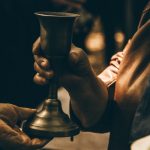Dear brother or sister, you may struggle with the assurance of your salvation. I know what that’s like. Sometimes I wonder, “Can I actually be saved if I have thoughts like this, if I have these desires? Am I really saved if I do things like this?” When we are conscious of our sinful thoughts and desires, when sinful words come hurling out of our mouths, when our behavior has proven to be yet again sinful and hurtful, it’s easy to think, “Am I actually a Christian or am I simply a hypocrite?” Have you ever thought similarly? Have you ever doubted your salvation? If you have, you know how dark those moments are. Lacking the assurance of salvation can produce in us anxiety, fear, doubt, and despair which impact our day-to-day routines. Lacking the assurance of salvation may even distance us from our brothers and sisters in Christ and the ministry of our local church. It does not please the Lord for us to live unsure of our salvation and to question the sufficiency of Christ for our salvation. We must believe the gospel, and when our faith is weak, we must avail ourselves of God’s means of grace to strengthen our faith and assure our hearts.
This August, I’ll be married for 18 years. Kristina, my lovely wife, by God’s grace and Spirit, has loved me faithfully for those 18 years. By God’s grace and Spirit, I have loved her. As with any marriage, we have challenges and struggles, but we delight in being married to one another. That said, I have had an unhelpful and fleeting thought, a Fiddler on the Roof “Do You Love Me?” thought. My insecurities create doubt. If these fleeting thoughts were to take hold, you can imagine how they would create problems in our marriage. I might be overprotective or angry or unhelpfully jealous or depressed. I may be so concerned about whether Kristina truly loves me that I fail to love her. If I ever wonder as Tevye did, “Do you love me?” I have much to look to for an answer. Besides her words, I see love in her actions. I could choose to be insecure about her love, but I’d have to accuse her of lying and ignore the many ways she does actually love me. So, it’s best I believe her when she says, “I love you.”
Are there good reasons for us to doubt that God loves us? Are there good reasons to doubt that we belong to Him? Are there good reasons to believe that Christ’s sacrifice was insufficient for us? I don’t think so. However, our faith is weak. We need reassurance, and God knows this. So, He has given us His means of grace to remind us of His love for us. Through the preaching of the Word, God declares to us the gospel. Through preaching, He unpacks His love for us so that we come to understand it more and more. But not only that, God says, “I love you” through His sacraments. Our baptism reminds us of God’s love for us, and so does the Lord’s Supper.
Protestants reject the Romanist view of transubstantiation where the bread and wine of communion transubstantiate or change from the substance of bread and wine into the actual body and blood of Christ. This is certainly an important theological debate, but it is also important for our comfort in Christ.
Heidelberg 78 asks, “Are then the bread and wine changed into the real body and blood of Christ?” When we take the Lord’s Supper together in church, do the bread and wine transubstantiate into the physical body and blood of Jesus? This is an important question. Heidelberg 78 gives a Biblical answer:
No. Just as the water of baptism is not changed into the blood of Christ and is not the washing away of sins itself but is simply God’s sign and pledge,1 so also the bread in the Lord’s Supper does not become the body of Christ itself,2 although it is called Christ’s body3 in keeping with the nature and usage of sacraments.4
That’s a helpful answer. When we were baptized by our minister, the water descending on our heads did not transubstantiate into Christ’s blood. Neither did the water itself wash away our sins. The water was God’s sign and pledge. The water pointed to Christ and to God’s promise of salvation in Christ alone. In the same way, the bread and the wine are signs and pledges of Christ’s sufficient substitutionary sacrifice. The bread and wine do not change, but they do point to Christ and God’s promise of salvation in Christ. They are called the body and blood of Christ to remain consistent with the Biblical text and the nature and usage of sacraments.
How is this an assurance for our weak faith? Let me read for you Heidelberg 79 and make one simple point. Heidelberg 79 goes as follows:
Why then does Christ call the bread His body and the cup His blood or the new covenant in His blood, and why does Paul speak of a participation in the body and blood of Christ? Christ speaks in this way for a good reason. He wants to teach us by His Supper that as bread and wine sustain us in this temporal life, so His crucified body and shed blood are true food and drink for our souls to eternal life. But even more important, He wants to assure us by this visible sign and pledge, first, that through the working of the Holy Spirit we share in His true body and blood as surely as we receive with our mouth these holy signs in remembrance of him, and, second, that all His suffering and obedience are as certainly ours as if we personally had suffered and paid for our sins.
Here’s the point I’d like you to get from that. God gives us the Lord’s Supper to teach and assure us. The sacraments are divine gifts through which our faithful and loving Lord teaches and assures us. Maybe we’re looking for assurance inside ourselves more than we’re looking outside ourselves to Christ alone. Bread and wine strengthen our bodies to live. Through the bread and wine, Christ our Lord is teaching us that he alone is true nourishment for our souls. Jesus said in John 6:51, “I am the living bread that came down from heaven. If anyone eats of this bread, he will live forever. And the bread that I will give for the life of the world is my flesh.” Why don’t you read vv. 52-59 on your own? Just like we receive the bread and wine from our minister, we receive Christ by faith and the bread and wine are learning tools.
Additionally, our Savior has given us the Lord’s Supper to assure us of our salvation in him. He gives us bread and wine or visible signs to eat to remind us over and over again that by the work of his powerful Holy Spirit, as much as we eat and taste the signs and pledges, we are truly united to him and share in his true body and blood. As we remember, we are strengthened. We are also assured that his pain, suffering, and perfect righteousness are ours through faith alone. God gives us Christ by His grace alone through faith alone which is the instrument through which He imputes to us the righteousness of Christ.
Maybe one problem we have with assurance is that we look to ourselves for assurance instead of looking to Christ in his means of grace? Are we looking for assurance in what we do? Are we grasping for assurance from the quality or quantity of our works for the Lord? It is better that we look to Christ in true faith to find assurance. What has Christ done for us? What is Christ continuing to do for us? When we look to Christ with true faith as he is given to us in the Word and sacraments ministry of our local church, we receive God’s assurance through God’s means. The Lord’s Supper is a marvelous gift from our God meant to strengthen our assurance by the works of Christ. Praise the Lord that He is mindful of you and me.
Quotes from the Heidelberg Catechism and creeds are taken from Zacharias Ursinus & Jonathan Shirk, The Heidelberg Catechism: True Comfort for Life & Death (Manheim: Small Town Theologian, 2021), 395.
Scripture quotations are from the ESV® Bible (The Holy Bible, English Standard Version®), copyright © 2001 by Crossway, a publishing ministry of Good News Publishers. Used by permission. All rights reserved. May not copy or download more than 500 consecutive verses of the ESV Bible or more than one half of any book of the ESV Bible.



